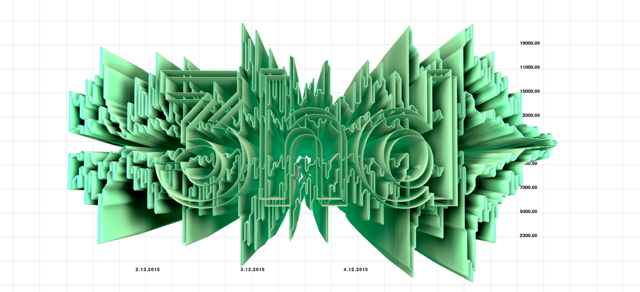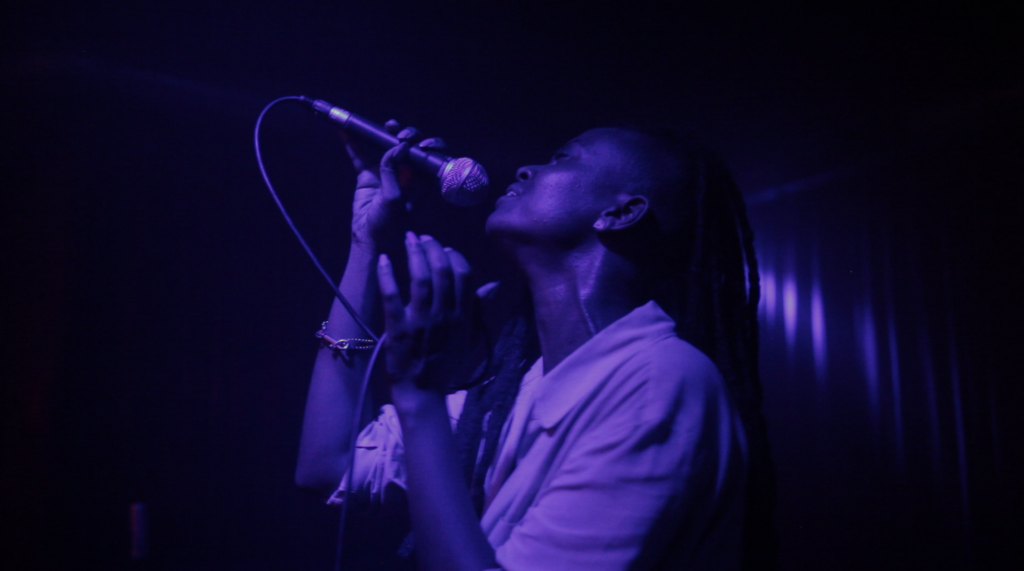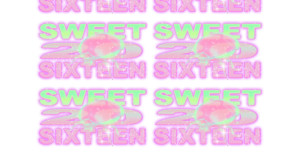It had never occurred to me to look at what the word Creamcake actually means. The top definition on Urban Dictionary calls it “A warm heaping stream of MASTURBATION! :D”. A Google search yields several baking recipes but that’s if you skip the website and the Soundcloud for the Berlin-based events organisers that come up at the top of search results – but my algorithm is biased.
If you visit the Creamcake website you’ll be met by a video of a preteen girl in a chlorinated pool swimming to the soundtrack of ‘DRAKE – OVOXO (TEAMS ∞ TRUST EDIT)’, and an impressive list of producers, performers and artists with links. The assumption is they’ve been part of the Creamcake party roster and if you’ve been lucky enough to be in Berlin to attend a Creamcake event, then you’d know that said assumption is right.
An ongoing club night organised by Berlin-based Bavarian-born DJs and academics, Daniela Seitz and Anja Weigl, the ongoing Creamcake programme has been happening with limited promotion and loads of kudos in the German city for the past four years. It’s featured the likes of Felicita, Elysia Crampton, and Club Cacao; Hanne Lippard, DJ Paypal and Kamixlo, and it’s a cog in an international art and music scene that is way ahead of the mainstream curve –one that started in bass music and expanded into anything dark, weird and, oddly, pop.

But Creamcake’s is a different kind of pop. It’s one that holds Berlin’s long-established tradition of the disruptive potential of the club, long after that potential was lost to the mainstreaming of techno culture. Now it can be found in the Twitter identity theft and cuteboy design aesthetic of Simon Whybray, the Dutch hardcore and gabber influences of Nkisi, and the opera compositions and drag performance of Colin Self. These are but a few of the artists announced for the upcoming 3hd Festival, the first organised by Creamcake, running online and off for the coming months and culminating in a four-day IRL event across four venues in Berlin, running December 2 to 5.
The live programme (see the first line-up announcement in full here) lists performances, DJ sets, a music video premiere by Easter, and discussions moderated by writer and academic Adam Harper. Online will be a series of essays, exclusive tracks and interviews in what is better described by the 3hd press release as a “label – magazine – festival” project, focused on art, music and the “hybrid practices” that have emerged from the era of the internet. Titled The Labour of Sound in a World of Debt, Seitz and Weigl spoke with aqnb on Skype, to point straight to the theme’s core and its articulations in art: Money, capitalism and the struggle to survive within it.
These concepts you’re working with in 3hd Festival, are they things that you had applied as you were programming the Creamcake parties, or did they reveal themselves in the process of putting them on?
Daniela Seitz: Creamcake started as a party restricted to the club environment, a place that brings people from different backgrounds together in a safe place. Everyone drinks and dances, gets wasted, and happier and happier as it’s happening. This was always fun, but we’ve been doing Creamcake for four years now, and we’re also getting a little older [laughs]. We kind of felt that with the HAU Hebbel am Ufer evening [Fragments of a Scene] back in April –where we had our first chance to work with an internationally established theatre –as a team, we really wanted to get more out of the concept, out of what we always had a vision for.
Anja Weigl: Yeah, exactly. It was a very inspiring opportunity.
Do you think if you took the music out of that context, which in this case would be Creamcake and put it on MTV, then it no longer is that interesting, like it’s exactly the same thing?
DS: I would agree with this. More people are adapting to our taste, including new parties and organizations. It helps to establish our community, a certain sound and taste in music, but we’ve always pushed past the mainstream. I wouldn’t say that we would succeed being on MTV or other mainstream channels, but, that would probably help our financial situation.
AW: [laughs].

You say that all this is on the internet, and then that there are these constant shifts in your interests. Do you think, then, that change is integral to Creamcake, in the same way that for information to continue to exist on the internet that it needs to constantly be in circulation?
DS: The internet opens windows for creativity and solidarity, and also transcends genres. Music is being shared among strangers across distances of megabytes and culture. There is so much content you can click on, read, and listen to. We’re very inspired by the cultural diversity online. But this also comes at the expense of exhaustion from having to check out everything.
AW: If we hear a musical style for too long –we also DJ –we feel the need for a change. First we were in touch with artists who explored EDM-flavoured pop, then it was more dark stuff, then Vogue for a while, then we were like ‘oh yeah, now we need something else’, or ‘oh, wow that sounds fresh’. Then the PC Music bubblegum sound was really inspiring to us, but we were feeling like ‘oh yeah, there still needs to be more’, in between the windows, you know? And there’s experimental music and new club music playing in the frame. There’s always change, change is important.
It’s an interesting way to think about that in terms of dogma because I often think about there being some kind of end goal or conclusion to a pursuit but in this case I don’t think there is, and having one would be unhelpful.
DS: The approach comes from innovation and change as the biggest shift in our society. When I was in university, I had to prepare presentations and papers about change management and innovation strategies in cultural institutions. When I wrote my Master thesis, I was researching about how a museum can be a platform for social change, and what it means to be a ‘responsible’ museum. That is to say, a new area in present museum work, and it will take years to transform such exclusive institutions, especially here in Germany. You always have to ask yourself, “what’s my role in this society?” So there you go. Creamcake’s current role is to empower smaller artists of the internet, offer them a platform to perform, and connect them with others in IRL.

I’m thinking about that in relation to the theme [The Labor of Sound in a World of Debt], as much as you’re inspired by capitalism, there’s very much an anti-capitalist sentiment.
DS: Yeah, it’s very nonpolitical, but also political, if that makes sense. We love to invite artists who are discovering new paths, or have just started their career. We find them on Soundcloud and/or through our own social network. These new online sources have outpaced the older capitalist logic, and signal a movement where something quite new and groundbreaking has arrived in music culture.
So say we’re in late-capitalism now, is there something after that and is that even desirable?
DS: Hmmmm. I mean, everything we do, we do as if we were a ten employee start up company, even if it’s just the two of us (and our assistant Sam). We focus heavily on strategy and marketing. But we also really love what we do: discovering new artists either for the performances or for the images, and introducing them to our community. This inspiration came always first in curating the general aesthetic, sound and images for Creamcake. The variables of money, time and work are barely connected, and a basic income is helpful for our team.
So in terms of your marketing strategies, where you find a stylish point of difference, you’re the Apple Computers, circa 2000, of music events.
DS: Yeah, you can say that [laughs]. I thought Apple Music failed.
I don’t mean Apple now, Apple now has become the status quo, in the same way that MTV has. It started as an alternative then became mainstream.
DS: I don’t think this is going to happen to us [laughs]. This is also the money question again, connected with taste and fairness. We always pay our artists, and would like to be able to pay more, so they can actually live from making music and art. When we hear how much bigger people get paid to work with more mainstream platforms and brands, it’s insane. It’s really insane.
AW: With Creamcake we really enjoy working with newer artists because it’s more fun and inspiring. You can feel their passion and excitement shine when you’re at Creamcake night. So Creamcake as a brand will always stay niche. But maybe the new babe, 3hd Festival, has full potential to perforate the mainstream.

Your attitude towards parties reminds me of Sick Girls…
AW: Yeah, they had started when we were still discovering Berlin’s nightlife, before we started putting on nights. When we moved to Berlin in 2007, we went to a show at a club called Picknick where they played alongside Jahcoozi. We’ve presented both of them separately at Creamcake in 2012 and 2013, I think.
It’s similar to them in the way you prefer emerging styles and scenes over ones that are too established.
AW: Yeah, definitely. Actually, they started to present the first bass music events here in Berlin, but then they stopped for some reason. Being a promoter who likes to take risks is definitely not going to bring you enough money for living, and that can be exhausting. With help from Musicboard Berlin, where we got our first cultural funding for 3hd Festival, we are able to bypass the financial issues that have prevented us in the past from really creating a more diverse experience for our audience.
I heard Claire Danes mentioned the Berghain on The Ellen DeGeneres show.
DS: Haha. Anja showed the video to me yesterday. She sees it in a funny way, which I’m thankful for. I get easily offended by people thinking Berlin is only techno, using it for their image, that they here discovered it, and it was all so crazy, and people were so crazy there, etc. And then Anja is like, ‘oh, this is so funny’.
AW: This is also really funny because techno is the big thing here, especially for Americans. Come on, Claire Danes is promoting techno music on the Ellen DeGeneres show? It makes me smile. **


